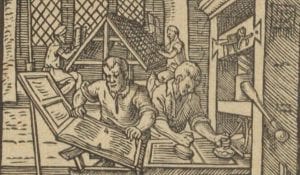Early European Books – new platform
Early European Books has moved to the powerful, award-winning ProQuest platform. Check out ProQuest’s user-friendly interface, a brand-new data visualization tool, and the ability to cross-search Early European Books with your other ProQuest content.

Catalogue record, available from: Early European Books.
Early European Books traces the history of printing in Europe from its origins through to the close of the seventeenth century, offering full-colour, high-resolution facsimile images of rare and hard-to-access printed sources. Early European Books has within its scope all works printed in Europe before 1701, regardless of language, together with all pre-1701 works in European languages printed further afield. It builds upon and complements Early English Books Online (EEBO) and is largely concerned with non-Anglophone materials.
The Library has access to Collections 1-10. Building on the success of Early English Books Online (EEBO), ProQuest has embarked on a European-wide project which will trace the history of printing in Europe from its origins (circa 1450s) to 1700. The Early European Books resource is set to encompass all European printed material from the early modern period. The contents are drawn from major repositories including the Danish Royal Library, the National Central Library in Florence, the National Library of France, the National Library of the Netherlands, and the Wellcome Library in London.
Early European Books allows unlimited access to thousands of pre-1701 books and rare incunabula printed in Europe. It embraces the two-and-a-half centuries following Gutenberg’s invention of movable type in the mid-15th century, which witnessed an unprecedented proliferation and dissemination of literature throughout Europe. In keeping with the tenor of the time, religious works dominate, but there is no shortage of secular material concerning every field of human thought and activity.
Drawing from a diverse array of primary sources in their original languages, this acclaimed series opens the door to in-depth scholarship that was once limited to fragile manuscripts housed in far-flung institutions.
Like this database? Please leave a comment.
Categories
Leave a Reply